Reflective Essay on Personal Values, Ethics and Social Work
VerifiedAdded on 2023/01/23
|9
|3166
|50
Essay
AI Summary
This reflective essay delves into the critical aspects of social work, focusing on the interplay between personal values, ethical codes, and professional conduct. The essay begins by exploring the formation and significance of personal values, such as loyalty, honesty, selfless service, integrity, adaptability, and responsibility, and how these values shape a social worker's approach to practice. It then analyzes the influence of these values on decision-making and interactions within the field. Furthermore, the essay examines the Australian Association of Social Workers (AASW) code of ethics, highlighting its core values of respect for persons, professional integrity, and social justice. The essay illustrates how the student's personal values align with and are guided by the AASW code, providing a framework for ethical practice. The essay concludes with a critical analysis of the statement, "Unconditional positive regard for the other is a core ethical position for professional social work practice," which demonstrates the importance of ethical considerations in social work.
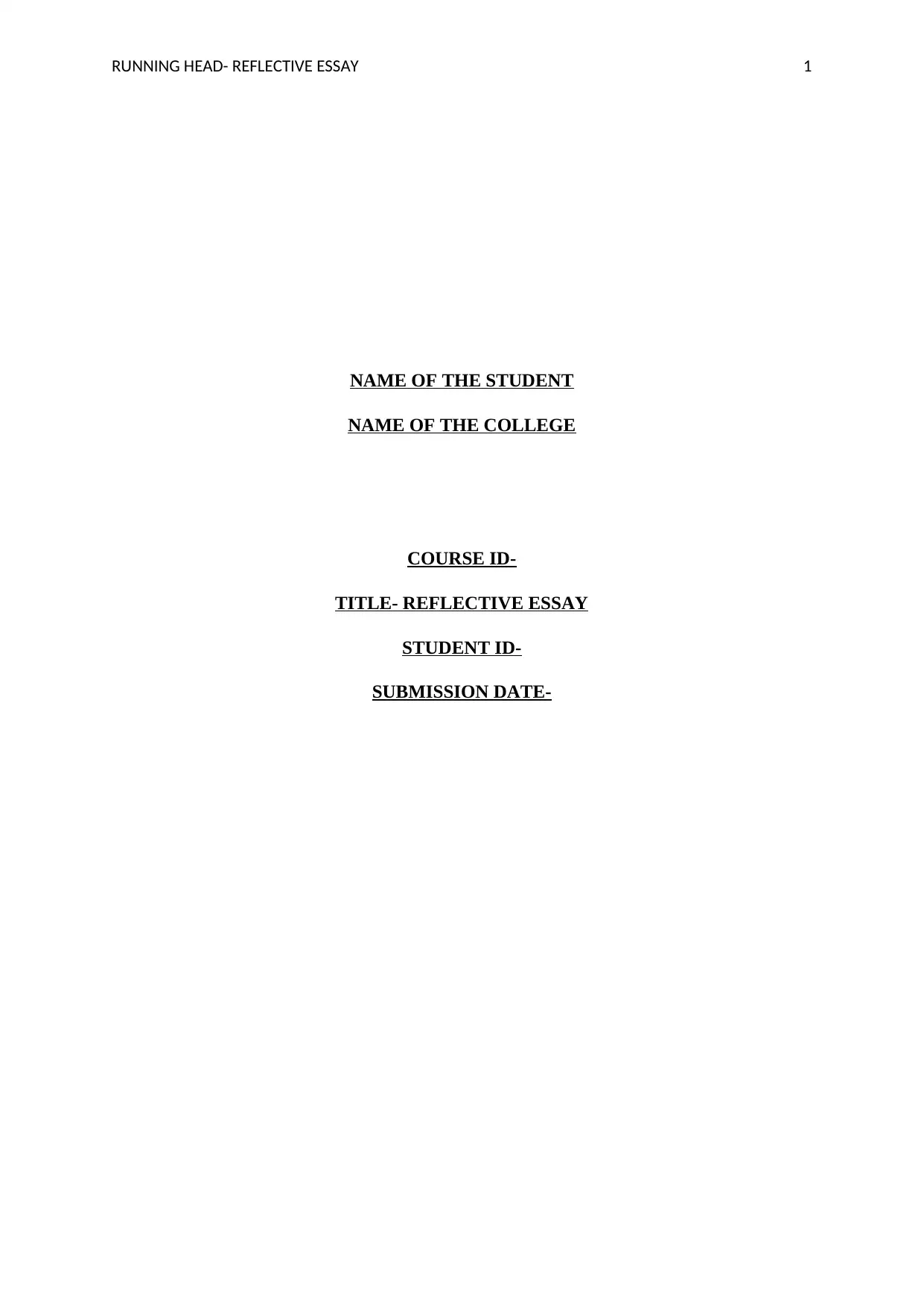
RUNNING HEAD- REFLECTIVE ESSAY 1
NAME OF THE STUDENT
NAME OF THE COLLEGE
COURSE ID-
TITLE- REFLECTIVE ESSAY
STUDENT ID-
SUBMISSION DATE-
NAME OF THE STUDENT
NAME OF THE COLLEGE
COURSE ID-
TITLE- REFLECTIVE ESSAY
STUDENT ID-
SUBMISSION DATE-
Paraphrase This Document
Need a fresh take? Get an instant paraphrase of this document with our AI Paraphraser
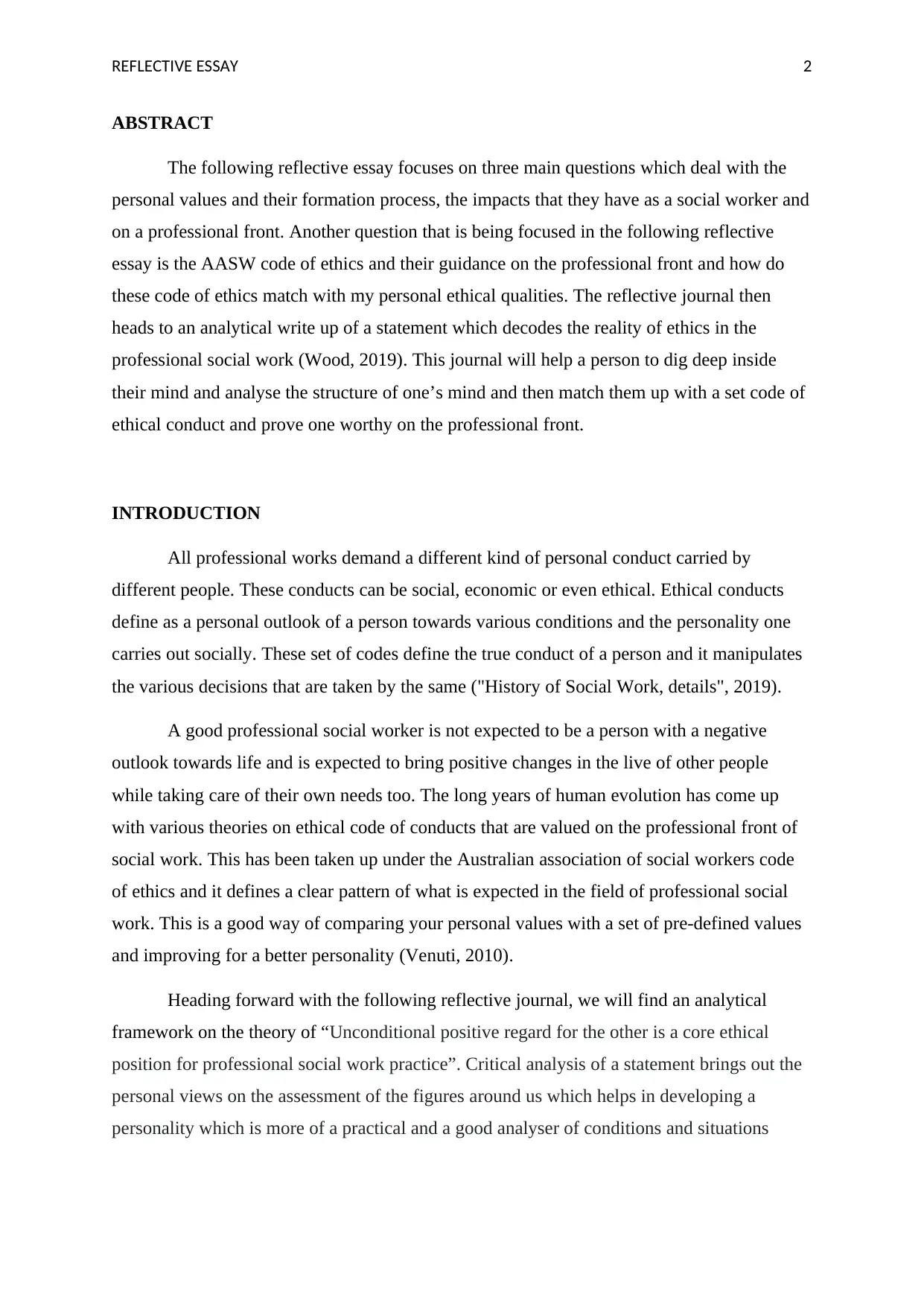
REFLECTIVE ESSAY 2
ABSTRACT
The following reflective essay focuses on three main questions which deal with the
personal values and their formation process, the impacts that they have as a social worker and
on a professional front. Another question that is being focused in the following reflective
essay is the AASW code of ethics and their guidance on the professional front and how do
these code of ethics match with my personal ethical qualities. The reflective journal then
heads to an analytical write up of a statement which decodes the reality of ethics in the
professional social work (Wood, 2019). This journal will help a person to dig deep inside
their mind and analyse the structure of one’s mind and then match them up with a set code of
ethical conduct and prove one worthy on the professional front.
INTRODUCTION
All professional works demand a different kind of personal conduct carried by
different people. These conducts can be social, economic or even ethical. Ethical conducts
define as a personal outlook of a person towards various conditions and the personality one
carries out socially. These set of codes define the true conduct of a person and it manipulates
the various decisions that are taken by the same ("History of Social Work, details", 2019).
A good professional social worker is not expected to be a person with a negative
outlook towards life and is expected to bring positive changes in the live of other people
while taking care of their own needs too. The long years of human evolution has come up
with various theories on ethical code of conducts that are valued on the professional front of
social work. This has been taken up under the Australian association of social workers code
of ethics and it defines a clear pattern of what is expected in the field of professional social
work. This is a good way of comparing your personal values with a set of pre-defined values
and improving for a better personality (Venuti, 2010).
Heading forward with the following reflective journal, we will find an analytical
framework on the theory of “Unconditional positive regard for the other is a core ethical
position for professional social work practice”. Critical analysis of a statement brings out the
personal views on the assessment of the figures around us which helps in developing a
personality which is more of a practical and a good analyser of conditions and situations
ABSTRACT
The following reflective essay focuses on three main questions which deal with the
personal values and their formation process, the impacts that they have as a social worker and
on a professional front. Another question that is being focused in the following reflective
essay is the AASW code of ethics and their guidance on the professional front and how do
these code of ethics match with my personal ethical qualities. The reflective journal then
heads to an analytical write up of a statement which decodes the reality of ethics in the
professional social work (Wood, 2019). This journal will help a person to dig deep inside
their mind and analyse the structure of one’s mind and then match them up with a set code of
ethical conduct and prove one worthy on the professional front.
INTRODUCTION
All professional works demand a different kind of personal conduct carried by
different people. These conducts can be social, economic or even ethical. Ethical conducts
define as a personal outlook of a person towards various conditions and the personality one
carries out socially. These set of codes define the true conduct of a person and it manipulates
the various decisions that are taken by the same ("History of Social Work, details", 2019).
A good professional social worker is not expected to be a person with a negative
outlook towards life and is expected to bring positive changes in the live of other people
while taking care of their own needs too. The long years of human evolution has come up
with various theories on ethical code of conducts that are valued on the professional front of
social work. This has been taken up under the Australian association of social workers code
of ethics and it defines a clear pattern of what is expected in the field of professional social
work. This is a good way of comparing your personal values with a set of pre-defined values
and improving for a better personality (Venuti, 2010).
Heading forward with the following reflective journal, we will find an analytical
framework on the theory of “Unconditional positive regard for the other is a core ethical
position for professional social work practice”. Critical analysis of a statement brings out the
personal views on the assessment of the figures around us which helps in developing a
personality which is more of a practical and a good analyser of conditions and situations
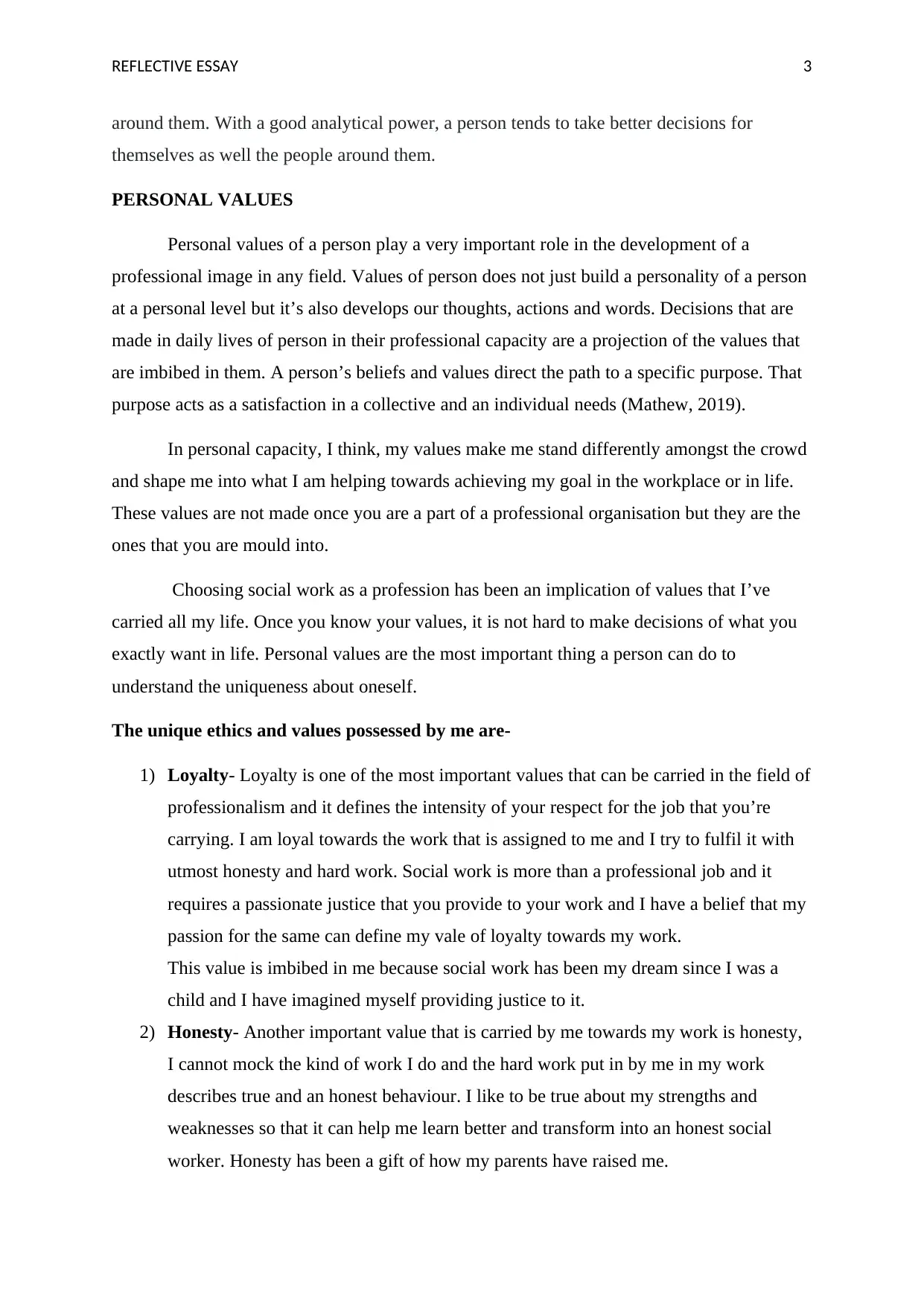
REFLECTIVE ESSAY 3
around them. With a good analytical power, a person tends to take better decisions for
themselves as well the people around them.
PERSONAL VALUES
Personal values of a person play a very important role in the development of a
professional image in any field. Values of person does not just build a personality of a person
at a personal level but it’s also develops our thoughts, actions and words. Decisions that are
made in daily lives of person in their professional capacity are a projection of the values that
are imbibed in them. A person’s beliefs and values direct the path to a specific purpose. That
purpose acts as a satisfaction in a collective and an individual needs (Mathew, 2019).
In personal capacity, I think, my values make me stand differently amongst the crowd
and shape me into what I am helping towards achieving my goal in the workplace or in life.
These values are not made once you are a part of a professional organisation but they are the
ones that you are mould into.
Choosing social work as a profession has been an implication of values that I’ve
carried all my life. Once you know your values, it is not hard to make decisions of what you
exactly want in life. Personal values are the most important thing a person can do to
understand the uniqueness about oneself.
The unique ethics and values possessed by me are-
1) Loyalty- Loyalty is one of the most important values that can be carried in the field of
professionalism and it defines the intensity of your respect for the job that you’re
carrying. I am loyal towards the work that is assigned to me and I try to fulfil it with
utmost honesty and hard work. Social work is more than a professional job and it
requires a passionate justice that you provide to your work and I have a belief that my
passion for the same can define my vale of loyalty towards my work.
This value is imbibed in me because social work has been my dream since I was a
child and I have imagined myself providing justice to it.
2) Honesty- Another important value that is carried by me towards my work is honesty,
I cannot mock the kind of work I do and the hard work put in by me in my work
describes true and an honest behaviour. I like to be true about my strengths and
weaknesses so that it can help me learn better and transform into an honest social
worker. Honesty has been a gift of how my parents have raised me.
around them. With a good analytical power, a person tends to take better decisions for
themselves as well the people around them.
PERSONAL VALUES
Personal values of a person play a very important role in the development of a
professional image in any field. Values of person does not just build a personality of a person
at a personal level but it’s also develops our thoughts, actions and words. Decisions that are
made in daily lives of person in their professional capacity are a projection of the values that
are imbibed in them. A person’s beliefs and values direct the path to a specific purpose. That
purpose acts as a satisfaction in a collective and an individual needs (Mathew, 2019).
In personal capacity, I think, my values make me stand differently amongst the crowd
and shape me into what I am helping towards achieving my goal in the workplace or in life.
These values are not made once you are a part of a professional organisation but they are the
ones that you are mould into.
Choosing social work as a profession has been an implication of values that I’ve
carried all my life. Once you know your values, it is not hard to make decisions of what you
exactly want in life. Personal values are the most important thing a person can do to
understand the uniqueness about oneself.
The unique ethics and values possessed by me are-
1) Loyalty- Loyalty is one of the most important values that can be carried in the field of
professionalism and it defines the intensity of your respect for the job that you’re
carrying. I am loyal towards the work that is assigned to me and I try to fulfil it with
utmost honesty and hard work. Social work is more than a professional job and it
requires a passionate justice that you provide to your work and I have a belief that my
passion for the same can define my vale of loyalty towards my work.
This value is imbibed in me because social work has been my dream since I was a
child and I have imagined myself providing justice to it.
2) Honesty- Another important value that is carried by me towards my work is honesty,
I cannot mock the kind of work I do and the hard work put in by me in my work
describes true and an honest behaviour. I like to be true about my strengths and
weaknesses so that it can help me learn better and transform into an honest social
worker. Honesty has been a gift of how my parents have raised me.
⊘ This is a preview!⊘
Do you want full access?
Subscribe today to unlock all pages.

Trusted by 1+ million students worldwide
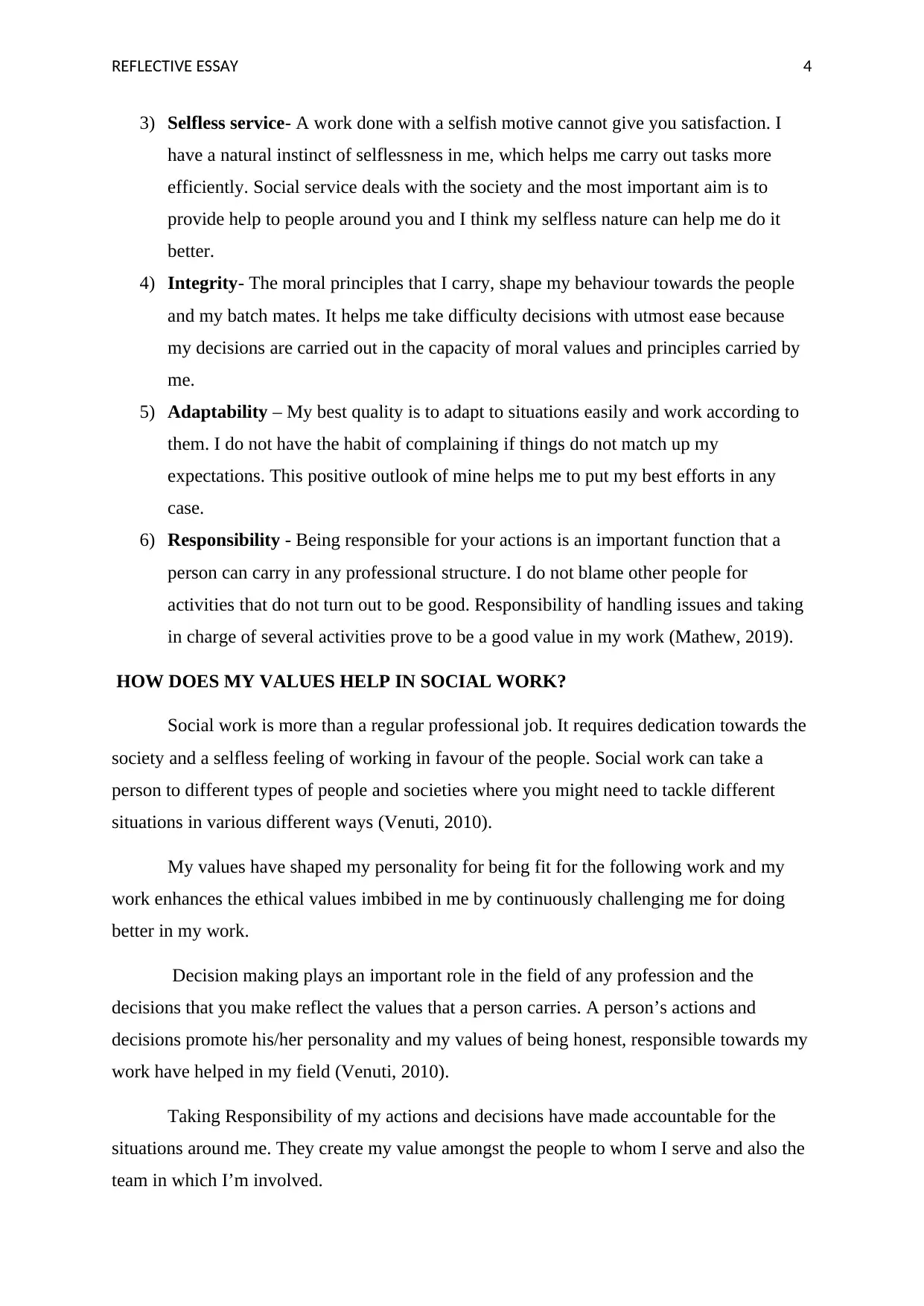
REFLECTIVE ESSAY 4
3) Selfless service- A work done with a selfish motive cannot give you satisfaction. I
have a natural instinct of selflessness in me, which helps me carry out tasks more
efficiently. Social service deals with the society and the most important aim is to
provide help to people around you and I think my selfless nature can help me do it
better.
4) Integrity- The moral principles that I carry, shape my behaviour towards the people
and my batch mates. It helps me take difficulty decisions with utmost ease because
my decisions are carried out in the capacity of moral values and principles carried by
me.
5) Adaptability – My best quality is to adapt to situations easily and work according to
them. I do not have the habit of complaining if things do not match up my
expectations. This positive outlook of mine helps me to put my best efforts in any
case.
6) Responsibility - Being responsible for your actions is an important function that a
person can carry in any professional structure. I do not blame other people for
activities that do not turn out to be good. Responsibility of handling issues and taking
in charge of several activities prove to be a good value in my work (Mathew, 2019).
HOW DOES MY VALUES HELP IN SOCIAL WORK?
Social work is more than a regular professional job. It requires dedication towards the
society and a selfless feeling of working in favour of the people. Social work can take a
person to different types of people and societies where you might need to tackle different
situations in various different ways (Venuti, 2010).
My values have shaped my personality for being fit for the following work and my
work enhances the ethical values imbibed in me by continuously challenging me for doing
better in my work.
Decision making plays an important role in the field of any profession and the
decisions that you make reflect the values that a person carries. A person’s actions and
decisions promote his/her personality and my values of being honest, responsible towards my
work have helped in my field (Venuti, 2010).
Taking Responsibility of my actions and decisions have made accountable for the
situations around me. They create my value amongst the people to whom I serve and also the
team in which I’m involved.
3) Selfless service- A work done with a selfish motive cannot give you satisfaction. I
have a natural instinct of selflessness in me, which helps me carry out tasks more
efficiently. Social service deals with the society and the most important aim is to
provide help to people around you and I think my selfless nature can help me do it
better.
4) Integrity- The moral principles that I carry, shape my behaviour towards the people
and my batch mates. It helps me take difficulty decisions with utmost ease because
my decisions are carried out in the capacity of moral values and principles carried by
me.
5) Adaptability – My best quality is to adapt to situations easily and work according to
them. I do not have the habit of complaining if things do not match up my
expectations. This positive outlook of mine helps me to put my best efforts in any
case.
6) Responsibility - Being responsible for your actions is an important function that a
person can carry in any professional structure. I do not blame other people for
activities that do not turn out to be good. Responsibility of handling issues and taking
in charge of several activities prove to be a good value in my work (Mathew, 2019).
HOW DOES MY VALUES HELP IN SOCIAL WORK?
Social work is more than a regular professional job. It requires dedication towards the
society and a selfless feeling of working in favour of the people. Social work can take a
person to different types of people and societies where you might need to tackle different
situations in various different ways (Venuti, 2010).
My values have shaped my personality for being fit for the following work and my
work enhances the ethical values imbibed in me by continuously challenging me for doing
better in my work.
Decision making plays an important role in the field of any profession and the
decisions that you make reflect the values that a person carries. A person’s actions and
decisions promote his/her personality and my values of being honest, responsible towards my
work have helped in my field (Venuti, 2010).
Taking Responsibility of my actions and decisions have made accountable for the
situations around me. They create my value amongst the people to whom I serve and also the
team in which I’m involved.
Paraphrase This Document
Need a fresh take? Get an instant paraphrase of this document with our AI Paraphraser
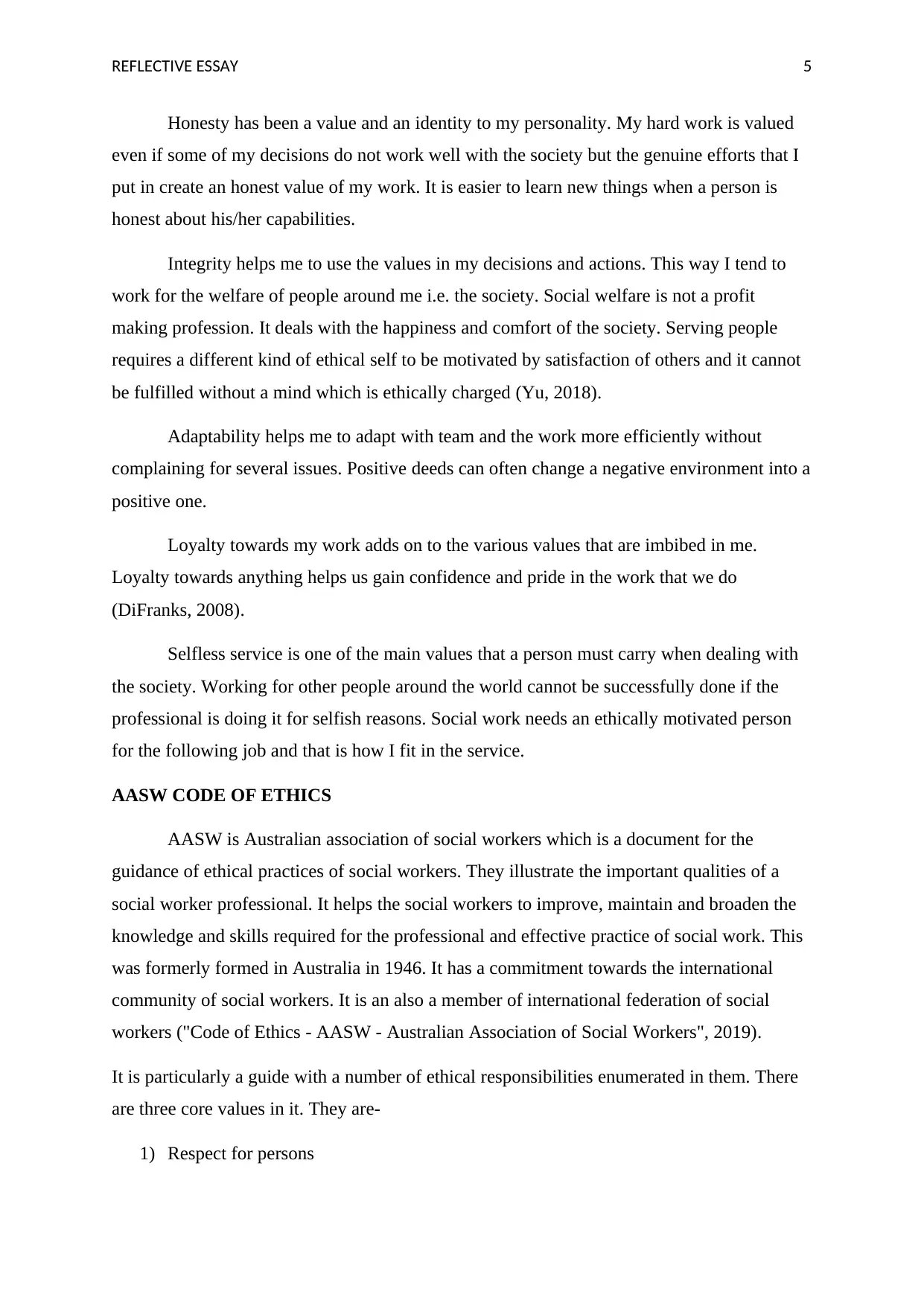
REFLECTIVE ESSAY 5
Honesty has been a value and an identity to my personality. My hard work is valued
even if some of my decisions do not work well with the society but the genuine efforts that I
put in create an honest value of my work. It is easier to learn new things when a person is
honest about his/her capabilities.
Integrity helps me to use the values in my decisions and actions. This way I tend to
work for the welfare of people around me i.e. the society. Social welfare is not a profit
making profession. It deals with the happiness and comfort of the society. Serving people
requires a different kind of ethical self to be motivated by satisfaction of others and it cannot
be fulfilled without a mind which is ethically charged (Yu, 2018).
Adaptability helps me to adapt with team and the work more efficiently without
complaining for several issues. Positive deeds can often change a negative environment into a
positive one.
Loyalty towards my work adds on to the various values that are imbibed in me.
Loyalty towards anything helps us gain confidence and pride in the work that we do
(DiFranks, 2008).
Selfless service is one of the main values that a person must carry when dealing with
the society. Working for other people around the world cannot be successfully done if the
professional is doing it for selfish reasons. Social work needs an ethically motivated person
for the following job and that is how I fit in the service.
AASW CODE OF ETHICS
AASW is Australian association of social workers which is a document for the
guidance of ethical practices of social workers. They illustrate the important qualities of a
social worker professional. It helps the social workers to improve, maintain and broaden the
knowledge and skills required for the professional and effective practice of social work. This
was formerly formed in Australia in 1946. It has a commitment towards the international
community of social workers. It is an also a member of international federation of social
workers ("Code of Ethics - AASW - Australian Association of Social Workers", 2019).
It is particularly a guide with a number of ethical responsibilities enumerated in them. There
are three core values in it. They are-
1) Respect for persons
Honesty has been a value and an identity to my personality. My hard work is valued
even if some of my decisions do not work well with the society but the genuine efforts that I
put in create an honest value of my work. It is easier to learn new things when a person is
honest about his/her capabilities.
Integrity helps me to use the values in my decisions and actions. This way I tend to
work for the welfare of people around me i.e. the society. Social welfare is not a profit
making profession. It deals with the happiness and comfort of the society. Serving people
requires a different kind of ethical self to be motivated by satisfaction of others and it cannot
be fulfilled without a mind which is ethically charged (Yu, 2018).
Adaptability helps me to adapt with team and the work more efficiently without
complaining for several issues. Positive deeds can often change a negative environment into a
positive one.
Loyalty towards my work adds on to the various values that are imbibed in me.
Loyalty towards anything helps us gain confidence and pride in the work that we do
(DiFranks, 2008).
Selfless service is one of the main values that a person must carry when dealing with
the society. Working for other people around the world cannot be successfully done if the
professional is doing it for selfish reasons. Social work needs an ethically motivated person
for the following job and that is how I fit in the service.
AASW CODE OF ETHICS
AASW is Australian association of social workers which is a document for the
guidance of ethical practices of social workers. They illustrate the important qualities of a
social worker professional. It helps the social workers to improve, maintain and broaden the
knowledge and skills required for the professional and effective practice of social work. This
was formerly formed in Australia in 1946. It has a commitment towards the international
community of social workers. It is an also a member of international federation of social
workers ("Code of Ethics - AASW - Australian Association of Social Workers", 2019).
It is particularly a guide with a number of ethical responsibilities enumerated in them. There
are three core values in it. They are-
1) Respect for persons
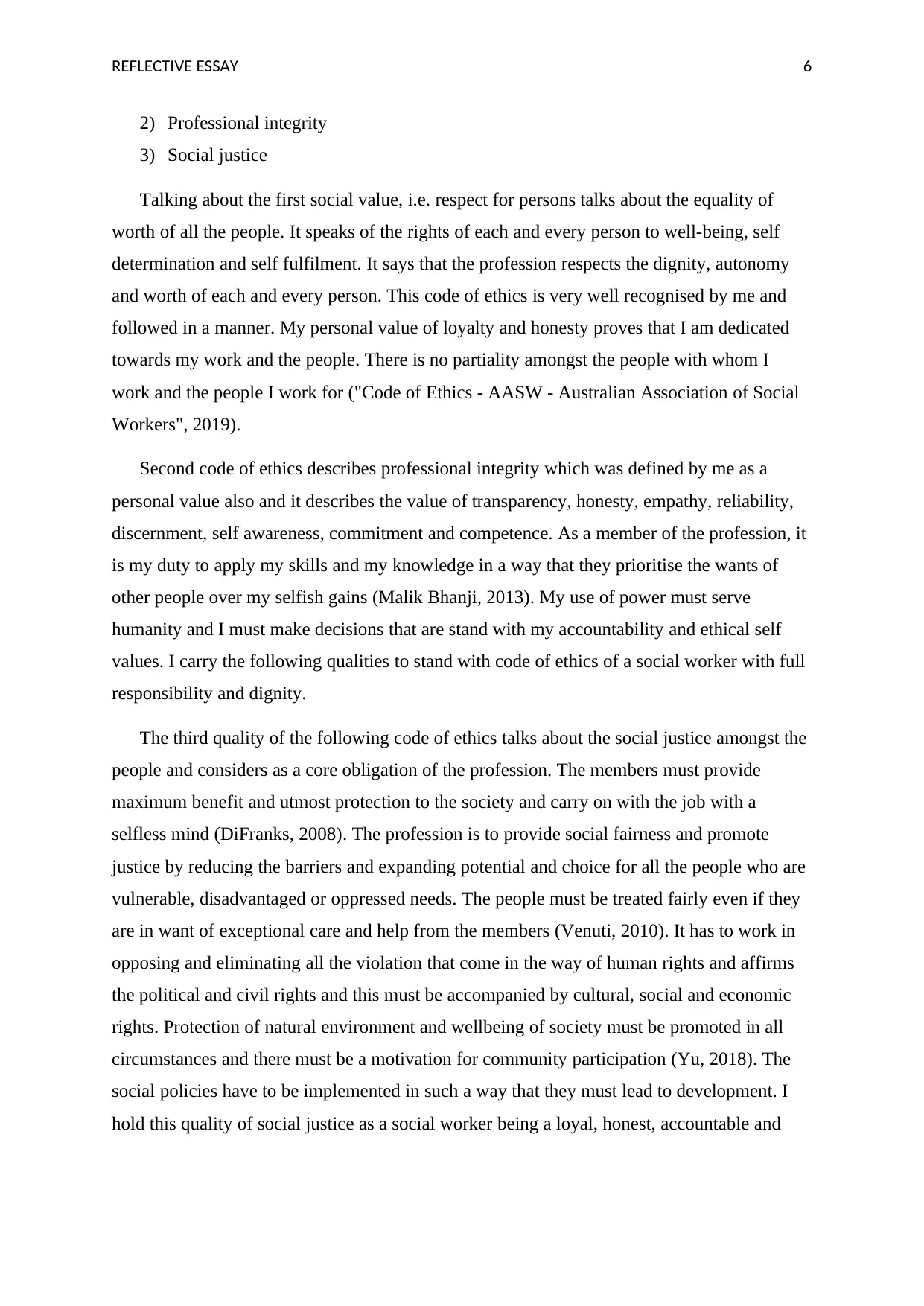
REFLECTIVE ESSAY 6
2) Professional integrity
3) Social justice
Talking about the first social value, i.e. respect for persons talks about the equality of
worth of all the people. It speaks of the rights of each and every person to well-being, self
determination and self fulfilment. It says that the profession respects the dignity, autonomy
and worth of each and every person. This code of ethics is very well recognised by me and
followed in a manner. My personal value of loyalty and honesty proves that I am dedicated
towards my work and the people. There is no partiality amongst the people with whom I
work and the people I work for ("Code of Ethics - AASW - Australian Association of Social
Workers", 2019).
Second code of ethics describes professional integrity which was defined by me as a
personal value also and it describes the value of transparency, honesty, empathy, reliability,
discernment, self awareness, commitment and competence. As a member of the profession, it
is my duty to apply my skills and my knowledge in a way that they prioritise the wants of
other people over my selfish gains (Malik Bhanji, 2013). My use of power must serve
humanity and I must make decisions that are stand with my accountability and ethical self
values. I carry the following qualities to stand with code of ethics of a social worker with full
responsibility and dignity.
The third quality of the following code of ethics talks about the social justice amongst the
people and considers as a core obligation of the profession. The members must provide
maximum benefit and utmost protection to the society and carry on with the job with a
selfless mind (DiFranks, 2008). The profession is to provide social fairness and promote
justice by reducing the barriers and expanding potential and choice for all the people who are
vulnerable, disadvantaged or oppressed needs. The people must be treated fairly even if they
are in want of exceptional care and help from the members (Venuti, 2010). It has to work in
opposing and eliminating all the violation that come in the way of human rights and affirms
the political and civil rights and this must be accompanied by cultural, social and economic
rights. Protection of natural environment and wellbeing of society must be promoted in all
circumstances and there must be a motivation for community participation (Yu, 2018). The
social policies have to be implemented in such a way that they must lead to development. I
hold this quality of social justice as a social worker being a loyal, honest, accountable and
2) Professional integrity
3) Social justice
Talking about the first social value, i.e. respect for persons talks about the equality of
worth of all the people. It speaks of the rights of each and every person to well-being, self
determination and self fulfilment. It says that the profession respects the dignity, autonomy
and worth of each and every person. This code of ethics is very well recognised by me and
followed in a manner. My personal value of loyalty and honesty proves that I am dedicated
towards my work and the people. There is no partiality amongst the people with whom I
work and the people I work for ("Code of Ethics - AASW - Australian Association of Social
Workers", 2019).
Second code of ethics describes professional integrity which was defined by me as a
personal value also and it describes the value of transparency, honesty, empathy, reliability,
discernment, self awareness, commitment and competence. As a member of the profession, it
is my duty to apply my skills and my knowledge in a way that they prioritise the wants of
other people over my selfish gains (Malik Bhanji, 2013). My use of power must serve
humanity and I must make decisions that are stand with my accountability and ethical self
values. I carry the following qualities to stand with code of ethics of a social worker with full
responsibility and dignity.
The third quality of the following code of ethics talks about the social justice amongst the
people and considers as a core obligation of the profession. The members must provide
maximum benefit and utmost protection to the society and carry on with the job with a
selfless mind (DiFranks, 2008). The profession is to provide social fairness and promote
justice by reducing the barriers and expanding potential and choice for all the people who are
vulnerable, disadvantaged or oppressed needs. The people must be treated fairly even if they
are in want of exceptional care and help from the members (Venuti, 2010). It has to work in
opposing and eliminating all the violation that come in the way of human rights and affirms
the political and civil rights and this must be accompanied by cultural, social and economic
rights. Protection of natural environment and wellbeing of society must be promoted in all
circumstances and there must be a motivation for community participation (Yu, 2018). The
social policies have to be implemented in such a way that they must lead to development. I
hold this quality of social justice as a social worker being a loyal, honest, accountable and
⊘ This is a preview!⊘
Do you want full access?
Subscribe today to unlock all pages.

Trusted by 1+ million students worldwide
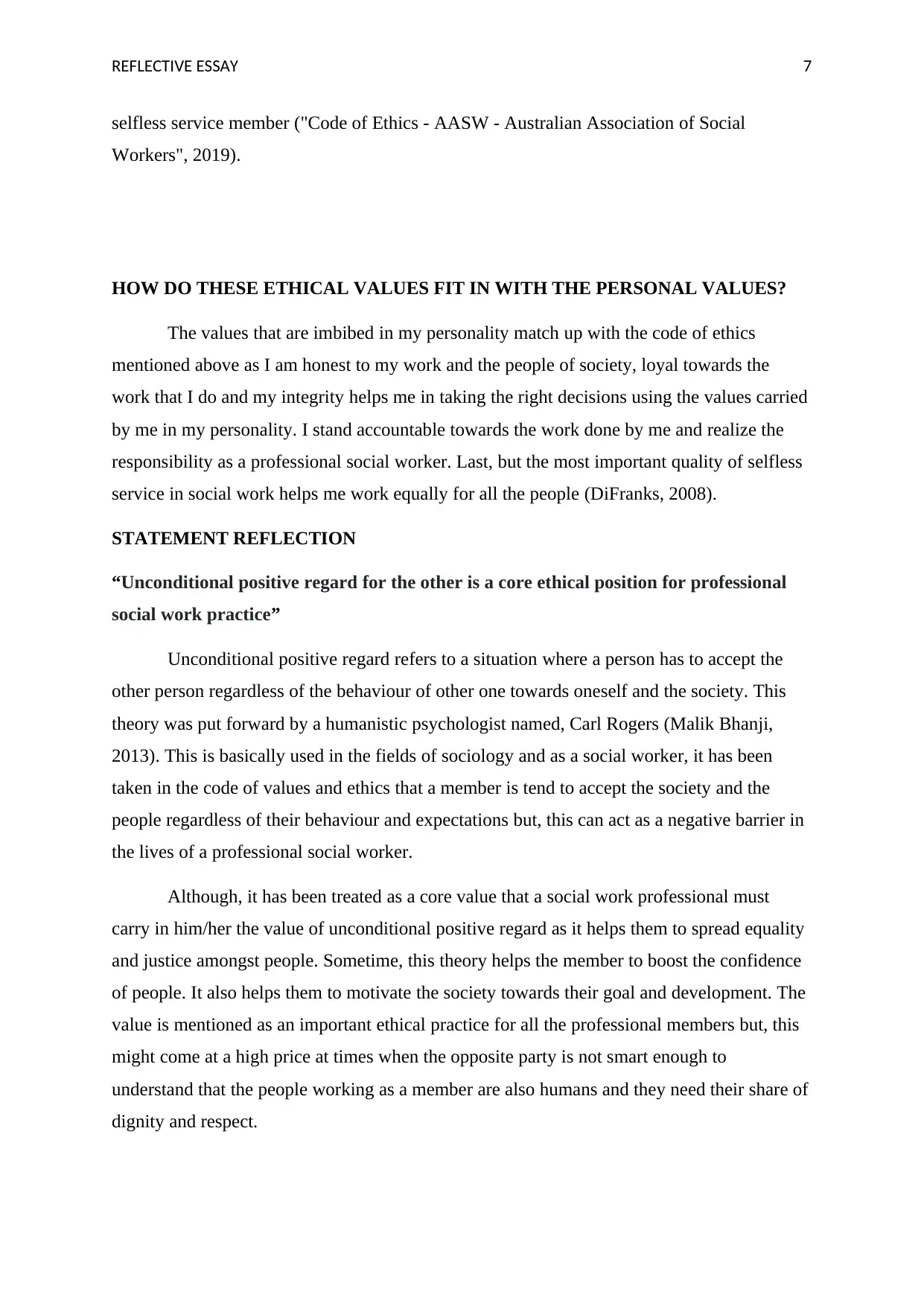
REFLECTIVE ESSAY 7
selfless service member ("Code of Ethics - AASW - Australian Association of Social
Workers", 2019).
HOW DO THESE ETHICAL VALUES FIT IN WITH THE PERSONAL VALUES?
The values that are imbibed in my personality match up with the code of ethics
mentioned above as I am honest to my work and the people of society, loyal towards the
work that I do and my integrity helps me in taking the right decisions using the values carried
by me in my personality. I stand accountable towards the work done by me and realize the
responsibility as a professional social worker. Last, but the most important quality of selfless
service in social work helps me work equally for all the people (DiFranks, 2008).
STATEMENT REFLECTION
“Unconditional positive regard for the other is a core ethical position for professional
social work practice”
Unconditional positive regard refers to a situation where a person has to accept the
other person regardless of the behaviour of other one towards oneself and the society. This
theory was put forward by a humanistic psychologist named, Carl Rogers (Malik Bhanji,
2013). This is basically used in the fields of sociology and as a social worker, it has been
taken in the code of values and ethics that a member is tend to accept the society and the
people regardless of their behaviour and expectations but, this can act as a negative barrier in
the lives of a professional social worker.
Although, it has been treated as a core value that a social work professional must
carry in him/her the value of unconditional positive regard as it helps them to spread equality
and justice amongst people. Sometime, this theory helps the member to boost the confidence
of people. It also helps them to motivate the society towards their goal and development. The
value is mentioned as an important ethical practice for all the professional members but, this
might come at a high price at times when the opposite party is not smart enough to
understand that the people working as a member are also humans and they need their share of
dignity and respect.
selfless service member ("Code of Ethics - AASW - Australian Association of Social
Workers", 2019).
HOW DO THESE ETHICAL VALUES FIT IN WITH THE PERSONAL VALUES?
The values that are imbibed in my personality match up with the code of ethics
mentioned above as I am honest to my work and the people of society, loyal towards the
work that I do and my integrity helps me in taking the right decisions using the values carried
by me in my personality. I stand accountable towards the work done by me and realize the
responsibility as a professional social worker. Last, but the most important quality of selfless
service in social work helps me work equally for all the people (DiFranks, 2008).
STATEMENT REFLECTION
“Unconditional positive regard for the other is a core ethical position for professional
social work practice”
Unconditional positive regard refers to a situation where a person has to accept the
other person regardless of the behaviour of other one towards oneself and the society. This
theory was put forward by a humanistic psychologist named, Carl Rogers (Malik Bhanji,
2013). This is basically used in the fields of sociology and as a social worker, it has been
taken in the code of values and ethics that a member is tend to accept the society and the
people regardless of their behaviour and expectations but, this can act as a negative barrier in
the lives of a professional social worker.
Although, it has been treated as a core value that a social work professional must
carry in him/her the value of unconditional positive regard as it helps them to spread equality
and justice amongst people. Sometime, this theory helps the member to boost the confidence
of people. It also helps them to motivate the society towards their goal and development. The
value is mentioned as an important ethical practice for all the professional members but, this
might come at a high price at times when the opposite party is not smart enough to
understand that the people working as a member are also humans and they need their share of
dignity and respect.
Paraphrase This Document
Need a fresh take? Get an instant paraphrase of this document with our AI Paraphraser
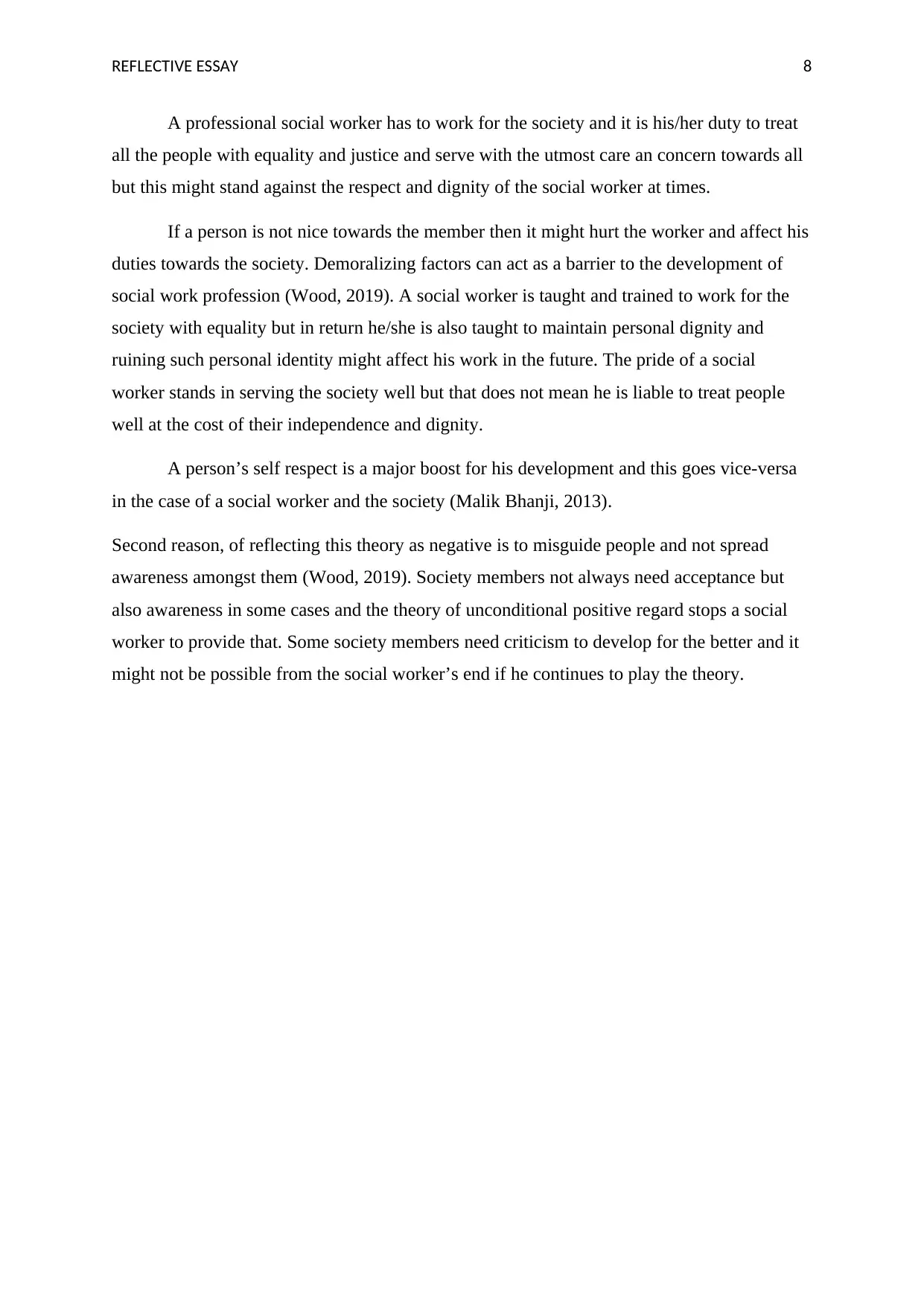
REFLECTIVE ESSAY 8
A professional social worker has to work for the society and it is his/her duty to treat
all the people with equality and justice and serve with the utmost care an concern towards all
but this might stand against the respect and dignity of the social worker at times.
If a person is not nice towards the member then it might hurt the worker and affect his
duties towards the society. Demoralizing factors can act as a barrier to the development of
social work profession (Wood, 2019). A social worker is taught and trained to work for the
society with equality but in return he/she is also taught to maintain personal dignity and
ruining such personal identity might affect his work in the future. The pride of a social
worker stands in serving the society well but that does not mean he is liable to treat people
well at the cost of their independence and dignity.
A person’s self respect is a major boost for his development and this goes vice-versa
in the case of a social worker and the society (Malik Bhanji, 2013).
Second reason, of reflecting this theory as negative is to misguide people and not spread
awareness amongst them (Wood, 2019). Society members not always need acceptance but
also awareness in some cases and the theory of unconditional positive regard stops a social
worker to provide that. Some society members need criticism to develop for the better and it
might not be possible from the social worker’s end if he continues to play the theory.
A professional social worker has to work for the society and it is his/her duty to treat
all the people with equality and justice and serve with the utmost care an concern towards all
but this might stand against the respect and dignity of the social worker at times.
If a person is not nice towards the member then it might hurt the worker and affect his
duties towards the society. Demoralizing factors can act as a barrier to the development of
social work profession (Wood, 2019). A social worker is taught and trained to work for the
society with equality but in return he/she is also taught to maintain personal dignity and
ruining such personal identity might affect his work in the future. The pride of a social
worker stands in serving the society well but that does not mean he is liable to treat people
well at the cost of their independence and dignity.
A person’s self respect is a major boost for his development and this goes vice-versa
in the case of a social worker and the society (Malik Bhanji, 2013).
Second reason, of reflecting this theory as negative is to misguide people and not spread
awareness amongst them (Wood, 2019). Society members not always need acceptance but
also awareness in some cases and the theory of unconditional positive regard stops a social
worker to provide that. Some society members need criticism to develop for the better and it
might not be possible from the social worker’s end if he continues to play the theory.
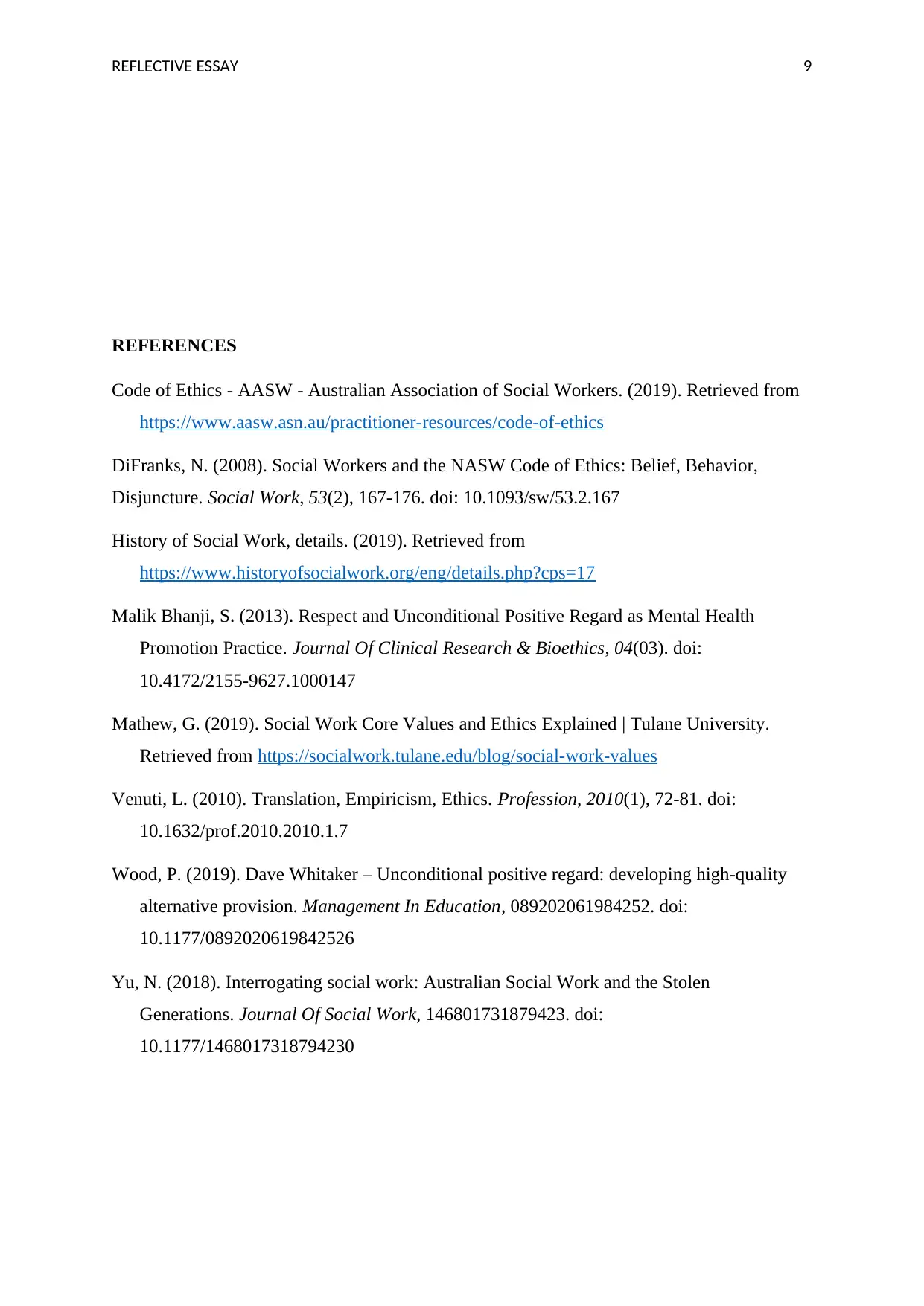
REFLECTIVE ESSAY 9
REFERENCES
Code of Ethics - AASW - Australian Association of Social Workers. (2019). Retrieved from
https://www.aasw.asn.au/practitioner-resources/code-of-ethics
DiFranks, N. (2008). Social Workers and the NASW Code of Ethics: Belief, Behavior,
Disjuncture. Social Work, 53(2), 167-176. doi: 10.1093/sw/53.2.167
History of Social Work, details. (2019). Retrieved from
https://www.historyofsocialwork.org/eng/details.php?cps=17
Malik Bhanji, S. (2013). Respect and Unconditional Positive Regard as Mental Health
Promotion Practice. Journal Of Clinical Research & Bioethics, 04(03). doi:
10.4172/2155-9627.1000147
Mathew, G. (2019). Social Work Core Values and Ethics Explained | Tulane University.
Retrieved from https://socialwork.tulane.edu/blog/social-work-values
Venuti, L. (2010). Translation, Empiricism, Ethics. Profession, 2010(1), 72-81. doi:
10.1632/prof.2010.2010.1.7
Wood, P. (2019). Dave Whitaker – Unconditional positive regard: developing high-quality
alternative provision. Management In Education, 089202061984252. doi:
10.1177/0892020619842526
Yu, N. (2018). Interrogating social work: Australian Social Work and the Stolen
Generations. Journal Of Social Work, 146801731879423. doi:
10.1177/1468017318794230
REFERENCES
Code of Ethics - AASW - Australian Association of Social Workers. (2019). Retrieved from
https://www.aasw.asn.au/practitioner-resources/code-of-ethics
DiFranks, N. (2008). Social Workers and the NASW Code of Ethics: Belief, Behavior,
Disjuncture. Social Work, 53(2), 167-176. doi: 10.1093/sw/53.2.167
History of Social Work, details. (2019). Retrieved from
https://www.historyofsocialwork.org/eng/details.php?cps=17
Malik Bhanji, S. (2013). Respect and Unconditional Positive Regard as Mental Health
Promotion Practice. Journal Of Clinical Research & Bioethics, 04(03). doi:
10.4172/2155-9627.1000147
Mathew, G. (2019). Social Work Core Values and Ethics Explained | Tulane University.
Retrieved from https://socialwork.tulane.edu/blog/social-work-values
Venuti, L. (2010). Translation, Empiricism, Ethics. Profession, 2010(1), 72-81. doi:
10.1632/prof.2010.2010.1.7
Wood, P. (2019). Dave Whitaker – Unconditional positive regard: developing high-quality
alternative provision. Management In Education, 089202061984252. doi:
10.1177/0892020619842526
Yu, N. (2018). Interrogating social work: Australian Social Work and the Stolen
Generations. Journal Of Social Work, 146801731879423. doi:
10.1177/1468017318794230
⊘ This is a preview!⊘
Do you want full access?
Subscribe today to unlock all pages.

Trusted by 1+ million students worldwide
1 out of 9
Related Documents
Your All-in-One AI-Powered Toolkit for Academic Success.
+13062052269
info@desklib.com
Available 24*7 on WhatsApp / Email
![[object Object]](/_next/static/media/star-bottom.7253800d.svg)
Unlock your academic potential
Copyright © 2020–2026 A2Z Services. All Rights Reserved. Developed and managed by ZUCOL.





